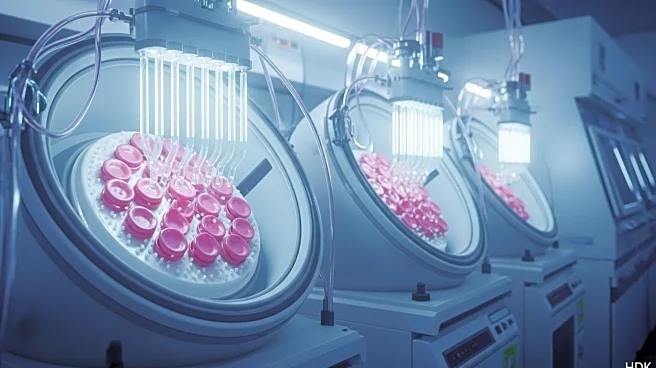What's Happening?
RedC Biotech, an Israeli startup, is pioneering the production of universal red blood cells from stem cells, aiming to revolutionize the global blood supply. Founded by Dr. Ari Gargir, the company is working to cultivate red blood cells in large bioreactors, potentially generating hundreds of transfusion-ready units at a time. This technology could provide a reliable and cost-effective supply of blood to hospitals worldwide, bypassing the limitations of human donation. The process involves stem cells that can divide and expand indefinitely under the right conditions, with the vision of producing thousands of liters of blood in large bioreactors.
Why It's Important?
RedC Biotech's innovation addresses critical blood shortages that affect hospitals globally, particularly in less advanced regions where many people die due to insufficient or substandard blood supplies. The ability to produce universal blood types that can fit everyone could save millions of lives annually, especially during emergencies, wars, and disasters. This advancement in biotechnology has the potential to transform healthcare by ensuring a consistent and safe blood supply, reducing dependency on human donors, and overcoming logistical challenges associated with blood donation.
What's Next?
RedC Biotech is focused on scaling up its operations, progressing toward preclinical and clinical trials, and eventually full-scale manufacturing. The company plans to establish factories worldwide to produce universal red blood cells under local regulations, ensuring reliable access in regions most affected by shortages. As the technology advances, RedC Biotech aims to collaborate with healthcare providers and regulatory bodies to integrate lab-grown blood into medical practices.
Beyond the Headlines
The development of lab-grown blood raises ethical and regulatory questions about biotechnology's role in healthcare. Ensuring the safety and efficacy of lab-grown blood will require rigorous testing and adherence to international standards. The potential to produce blood on an industrial scale also highlights the need for transparent practices and collaboration between biotech companies and healthcare systems to address global health disparities.











